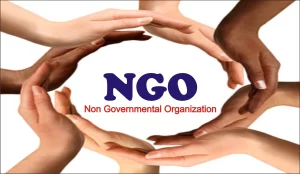![]()
 Non-Governmental Organization
Non-Governmental Organization
The term “NGO” stands for Non-Governmental Organization. NGOs are typically independent, non-profit organizations that operate independently of government control and are focused on addressing specific social or environmental issues. NGOs can be established by individuals, groups of individuals, or even corporations.
There are countless NGOs operating worldwide, each with its own specific mission, goals, and focus areas.
Some well-known international NGOs include:
Amnesty International:
A global human rights organization that works to promote and protect human rights worldwide.
Greenpeace:
An environmental organization that focuses on issues such as climate change, deforestation, and biodiversity conservation.
Doctors Without Borders (Médecins Sans Frontières):
A medical humanitarian organization that provides emergency medical aid to populations affected by conflict, epidemics, and natural disasters.
Oxfam:
An organization dedicated to fighting poverty and inequality worldwide through various programs in areas such as humanitarian response, economic development, and advocacy.
World Wildlife Fund (WWF):
A conservation organization focused on protecting the environment and endangered species.
It’s important to note that there are numerous NGOs operating at the national, regional, and local levels, addressing a wide range of issues such as education, healthcare, women’s rights, children’s welfare, community development, and more. The specific NGO you may be referring to would depend on the context or the specific organization you have in mind.
To visit:https://services.india.gov.in
FAQs
1.What is an NGO?
- An NGO is a non-profit organization that operates independently from the government, often focusing on social, environmental, or humanitarian issues.
2. What are the main functions of NGOs?
- NGOs work on various issues, including education, health care, environmental protection, human rights, and community development.
3. How are NGOs funded?
- NGOs are typically funded through donations, grants, membership fees, and sometimes government support or corporate sponsorship.
4. Are NGOs registered?
- Yes, most NGOs are register under specific laws, which can vary by country, ensuring legal recognition and accountability.
5. Can anyone start an NGO?
- Yes, anyone can start an NGO, but they must follow legal requirements and registration processes in their country.
6. What is the difference between an NGO and a charity?
- While both are non-profit, NGOs often have broader goals and may engage in advocacy and policy work, whereas charities primarily focus on direct aid.
7. How do NGOs impact communities?
- NGOs provide essential services, raise awareness about issues, advocate for policy changes, and empower communities through education and resources.
8. Can NGOs operate internationally?
- Yes, many NGOs work globally, addressing issues that transcend borders, such as poverty, health crises, and climate change.
9. Are NGOs accountable for their actions?
- Yes, NGOs are usually require to maintain transparency, report on their activities, and demonstrate how funds are use to ensure accountability.
10. How can individuals support NGOs?
- Individuals can support NGOs by donating money, volunteering time, participating in campaigns, or raising awareness about their causes.